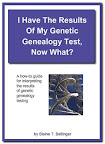
I came across an abstract posted earlier this month that has me wondering, "What's up with this?" Evidently there are some researchers who are looking for a possible connection between Alzheimer's Disease and the various haplogroups. Haplogroup H is mentioned as is cluster HV (Is that a subclade?). I'm not sure what they concluded from their research but you can read the abstract here:
Mitochondrial haplogroup H and Alzheimer's disease—Is there a connection? Neurobiology of Aging, In Press, Corrected Proof, Available online 4 March 2008, Aleksandra
Maruszak, Jeffrey A Canter, Maria Styczyńska, Cezary Żekanowski and Maria Barcikowska
View Abstract (specifically mentions hg H)
Additional research abstracts I found on the subject are: Analysis of European mitochondrial haplogroups with Alzheimer disease risk Neuroscience Letters, Volume 365, Issue 1, 15 July 2004, Pages 28-32 Joelle M.
van der Walt, Yulia A. Dementieva, Eden R. Martin, William K. Scott, Kristin K. Nicodemus, Charles C. Kroner, Kathleen A. Welsh-Bohmer, Ann M. Saunders, Allen D. Roses, Gary W. Small, Donald E. Schmechel, P. Murali Doraiswamy, John R. Gilbert, Jonathan L. Haines, Jeffery M. Vance and Margaret A. Pericak-Vance
View Abstract (specifically mentions hg H)
Lack of association between mtDNA haplogroups and Alzheimer's disease in Tuscany.
Neurol Sci. 2007 Jun;28(3):142-7. Epub 2007 Jun 30. Mancuso M, Nardini M, Micheli D, Rocchi A, Nesti C, Giglioli NJ, Petrozzi L, Rossi C, Ceravolo R, Bacci A, Choub A, Ricci G, Tognoni G, Manca ML, Siciliano G, Murri L. View Abstract
Mitochondrial DNA haplogroups and susceptibility to AD and dementia with Lewy bodies.
Neurology. 2000 Jul 25;55(2):302-4. Chinnery PF, Taylor GA, Howell N, Andrews RM, Morris CM, Taylor RW, McKeith IG, Perry RH, Edwardson JA, Turnbull DM. View Abstract (Specifically mentions hg H)
Do haplogroups H and U act to increase the penetrance of Alzheimer's disease?
Cell Mol Neurobiol. 2007 May;27(3):329-34. Epub 2006 Dec 21. Fesahat F, Houshmand M, Panahi MS, Gharagozli K, Mirzajani F. "We could find that haplogroups H and U are significantly more abundant in AD patients (P = 0.016 for haplogroup H and P = 0.0003 for haplogroup U), Thus, these two haplogroups might act synergistically to increase the penetrance of AD disease."
View Abstract (Specifically mentions hg H)
I must admit that I don't understand the content of most of these abstracts, except the last one. It sounds like in that study they are saying that they found more members from haplogroups H and U in the group of Alzheimer's patients they studied. I'm not sure what "penetrance of AD disease" means.
I don't know what to make of all these articles. The fact that there are multiple research teams looking for a possible connection between haplogroups and Alzheimer's Disease, with hg H coming up repeatedly in the literature, makes me tend to think that they suspect there is some kind of connection there but they haven't figured out what the connection is. Or maybe they have and I just can't figure it out from the way they're presenting it ;-)
Interestingly, late onset Alzheimer's Disease runs in my maternal line, those that carry my same mtDNA. My mother and her sister both had it in their mid 80s. My maternal grandmother died at age 70 from complications of diabetes but her sister, my maternal grandaunt, had AD in her early 90s.
What are your thoughts? Do you know of any AD in your mtDNA line?





